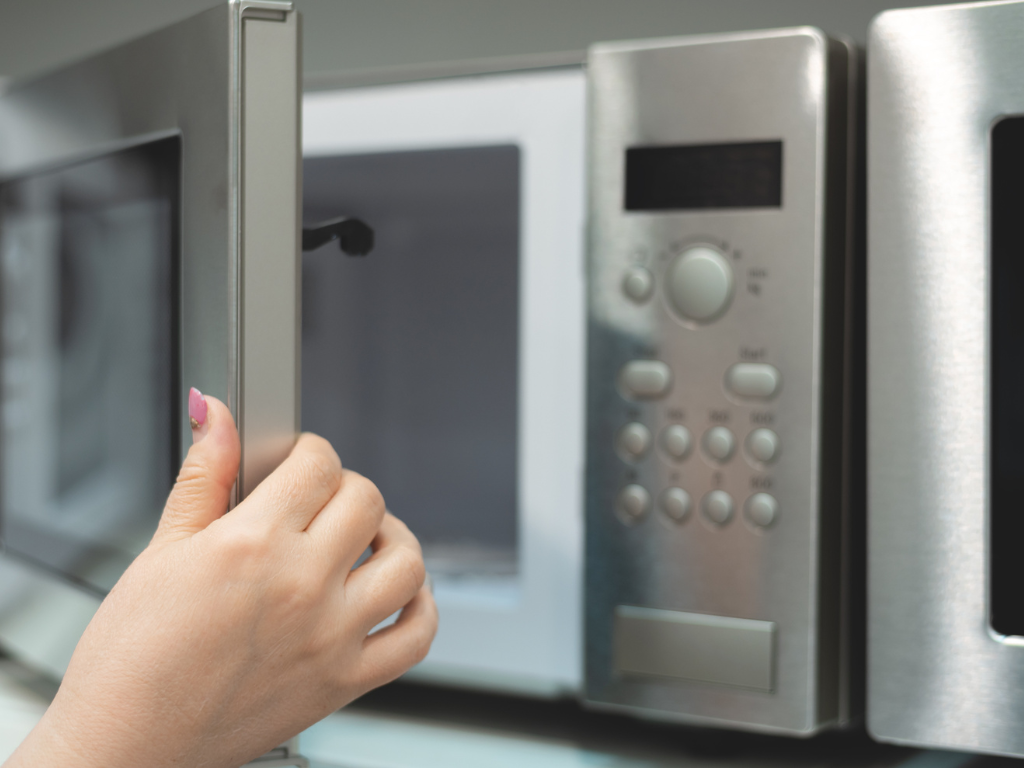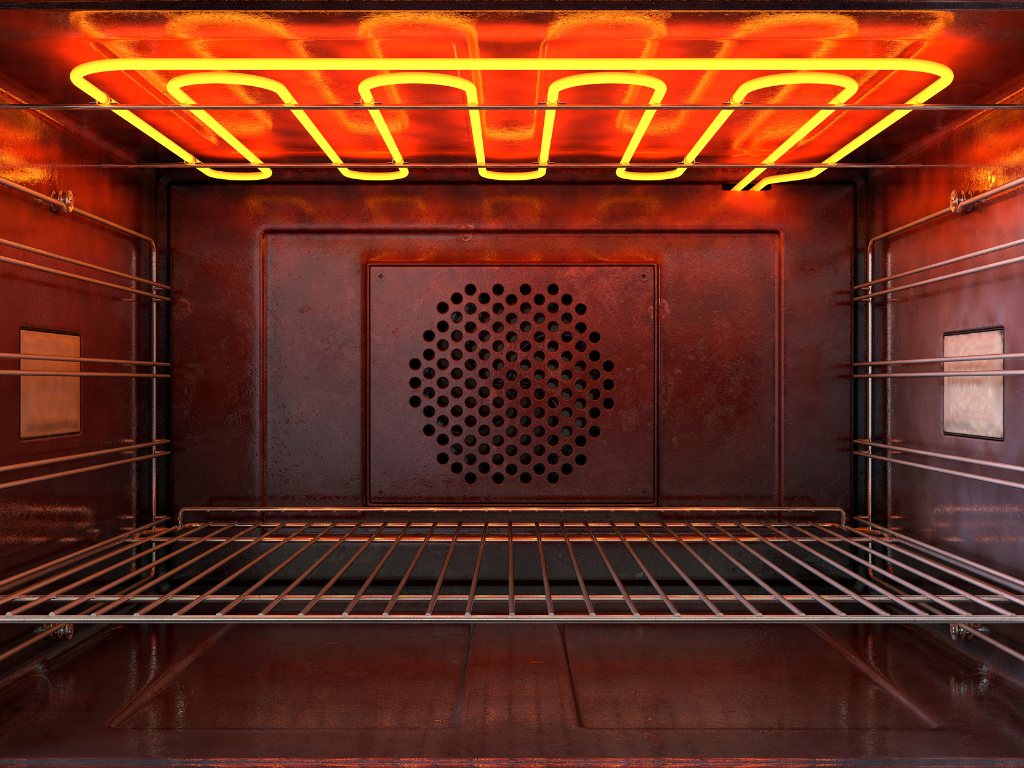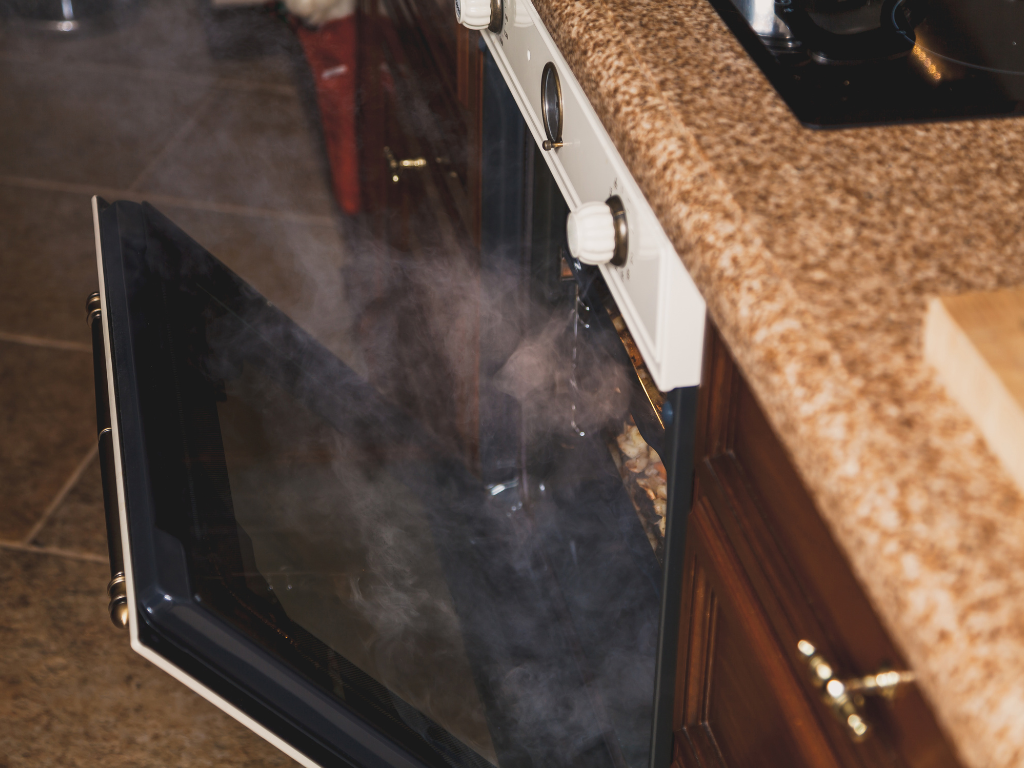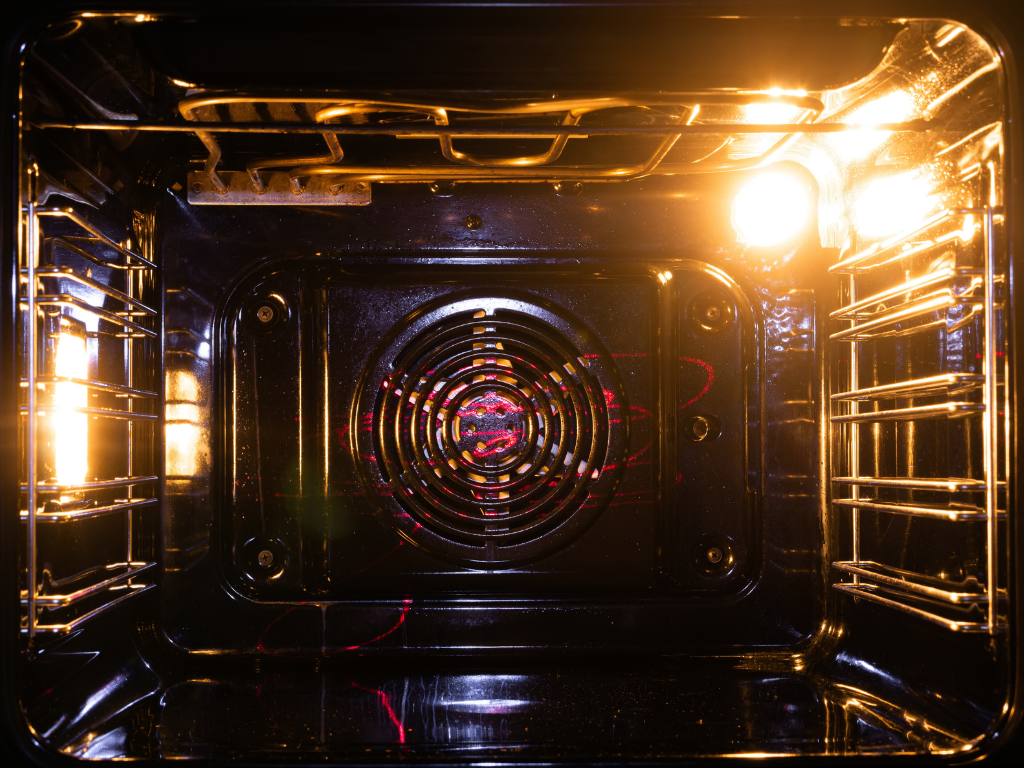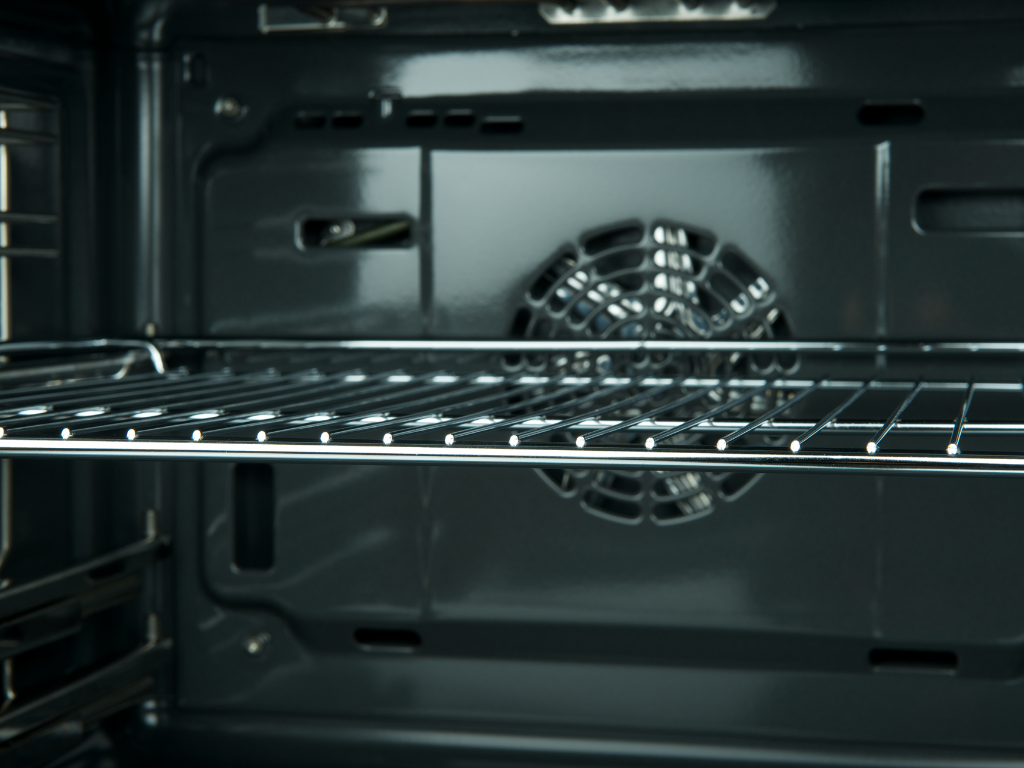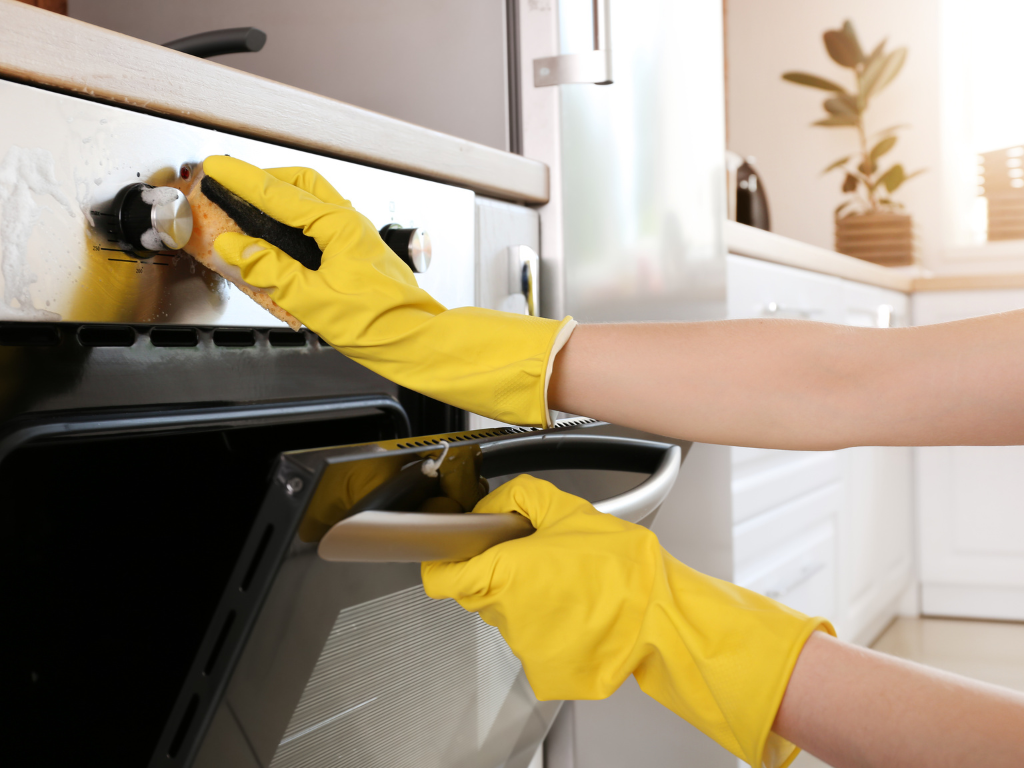Key Takeaway:
- Understanding gas smell during preheating: It’s essential to understand why your oven smells like gas when preheating. This is because the gas smell could indicate a potential gas leak or other issues that need to be addressed immediately.
- Gas leak precautions: If you notice a strong gas smell, leave the area immediately and contact a qualified professional to inspect your oven. It’s also essential to avoid any actions that could cause sparks or flames, such as turning on lights or using your phone.
- Failing gas igniter: One of the most common causes of a gas smell during preheating is a failing gas igniter. You can try checking and replacing the igniter yourself, but it’s often best to leave this task to a trained professional to avoid any further damage to your oven.
Ever experienced a smell of gas while preheating your oven? Worried something’s wrong? Don’t be! Here, you’ll discover possible causes of the gas-like smell. Plus, how to fix it safely. Find the right solution. Then, you can get back to enjoying your yummy homemade meals quickly!
Understanding Gas Smell during Preheating
Understanding Gas Smell during Preheating
Have you ever experienced a strong gas smell when preheating your oven? This can be a concerning and potentially dangerous situation. However, it is important to understand that a small gas smell during preheating is normal.
The reason why you may smell gas during preheating is due to the oven’s igniter heating up and igniting the gas flame. This process can create a small amount of gas smell, especially if it has been a long time since your oven was last used. Additionally, if there are any packaging materials or debris trapped inside the oven or its vents, this can create a gas smell.
If you notice a very strong gas smell, or one that persists even after the oven has reached the desired temperature, it may indicate a gas leak or a failing igniter. In this case, it is important to immediately evacuate your home and call a professional to inspect your oven and gas connections.
To prevent a gas smell during preheating, it is important to regularly clean your oven of any spills, debris, or packaging materials. Additionally, make sure your oven vents are not blocked, and always use the proper-sized breaker for your stove to prevent overloading the electrical system. If you suspect an issue with your oven, such as a failing igniter, use a multimeter to check for continuity in the wiring harness or gas valve, or contact a professional for assistance.
In summary, while a small gas smell during preheating is normal, a strong or persistent gas smell can indicate a potential gas leak or other issue with your oven. Regular cleaning and proper maintenance can help prevent these issues and keep you and your home safe.
Odorant and Gas Smell
Have you ever turned on your oven to preheat it, only to smell gas? If so, you’re not alone. The smell of gas can be alarming, but it’s important to understand the reason behind it. In this part of the discussion, let’s talk about the odorant and gas smell. We’ll talk about why odorant is added to natural gas, the factors that affect the strength of gas smell, and when you should worry about a strong gas smell in your oven. So, sit tight and let’s explore why the smell of gas may come from your oven during preheating.
Why Odorant is Added to Natural Gas
Odorant is what gives natural gas its smell. It’s a chemical that smells like sulfur or rotting eggs and is added to natural gas for safety purposes.
The reason odorant is added to natural gas is so that people will be able to detect a leak. Natural gas is odorless, so without the smell, it can be difficult to tell if there’s a problem. If you smell natural gas, it’s important to get everyone out of the area immediately and call your utility company.
While the smell of gas can be very unpleasant, it’s better than not being able to detect a leak at all. If you don’t have an odorant in your natural gas and there is a leak, you run the risk of inhaling carbon monoxide, which can be deadly.
If you’re experiencing an oven that smells like gas when preheating, it could be due to a number of reasons. It could be because the burner tube or vents are blocked or because there’s a problem with your oven. In this case, it’s best to contact an expert technician who can diagnose the issue and fix it for you.
If you ever experience anything unusual with your natural gas or suspect a leak, evacuate the area immediately and call your utility company right away to investigate. Don’t put yourself or others in harm’s way by ignoring what may seem like just another odd smell.
Factors Affecting Strength of Gas Smell
Blocked vents are another factor that affects the strength of the gas smell coming from the oven. Vents allow air to circulate within the oven and prevent smells from remaining trapped inside. If these obstructions build up within the vents, they will interfere with proper airflow and contribute to a strong gas smell.
The size of your breaker for stove also plays an important role in ensuring there is no gas leakage. Electrical appliances need sufficient wattage demand; therefore, if a stove’s electrical circuit is not fittingly equipped, it can create power issues that may lead to odors.
Oven taking too long to preheat can cause unwanted gas odors because an under-preheated oven can leave behind residual chemicals from cooking fumes over time.
LG oven F9 error signifies problems with your appliance’s heating element. This error means your LG Oven cannot bake or broil correctly as needed, resulting in problematic cooking experiences.
It was late at night, and Becky decided finally she would bake her favorite dish that required all sorts of special herbs and spices. As she was preheating her oven, she realized there was a strange odor emanating from her new toaster oven – one that smelled like lighter fluid! Becky panicked but quickly shut off the appliance before a potential disaster occurred due to some underlying issue in her toaster oven’s electronics or connections.
Overall, we have discussed various factors affecting the strength of the gas smell when using ovens for cooking purposes such as dirty ovens or blocked vents. We have seen how electrical circuits affect preheating times, LG ovens come with unique errors that result in an unpleasant cooking experience, and finally, shared a story of how someone faced a gas smell when they preheated their toaster oven. Knowing these factors can help you avoid the unpleasant experience of smelling gas when cooking.
When to Worry About a Strong Gas Smell
If you smell gas in your home, it’s not always cause for immediate alarm. However, if you notice a strong gas odor, that could be a sign of a gas leak and should be taken seriously. Gas leaks can lead to fires or explosions, so it’s important to know when to worry about a strong gas smell.
When you first move into a new home or have a new appliance installed, you may notice some gas odors as your system adjusts. This is normal and should go away after a few uses. However, if the smell persists or gets stronger over time, that’s when you should start worrying.
If you smell gas outside of your home or near the meter, that’s also cause for concern. It could mean there are issues with the infrastructure or gas lines leading to your home. In this case, it’s best to contact your utility company immediately and have them investigate.
Another sign that you should worry about a strong gas smell is if you hear any hissing noises coming from your appliances or pipes. This could indicate a leak and should be investigated as soon as possible by a professional.
Pro Tip: If you ever suspect there is a gas leak in your home, the first thing you should do is evacuate everyone and call 911 or your local utility company from outside of the house. Do NOT turn on any lights or start any appliances, including cell phones, as this could trigger an explosion.
Gas Leak Precautions
Let’s get right to it – we all love cooking in our ovens, but no one likes the smell of gas that can often accompany preheating. That said, a gas leak is no laughing matter and should be taken seriously. In this section, I’ll share some helpful tips for gas leak precautions that you can take to keep your home safe.
We’ll start with what to do in the case of a strong gas smell and how to recognize the early warning signs of a gas leak. I’ll also cover what not to do during a gas leak to avoid any disastrous outcomes.
What to Do in Case of a Strong Gas Smell
In case of a strong gas smell in your home, it is important to take immediate action to prevent any potential danger. Here’s what you should do:
- Turn off any flames or sources of ignition immediately.
- Open all doors and windows in the area to allow fresh air to circulate throughout the room.
- Evacuate the building as soon as possible, especially if you notice any signs of nausea or dizziness.
- Call your gas supplier or emergency services on 911 from outside the home.
- Do not turn on any electrical devices, including switches or appliances such as phones, lights, televisions or computers indoors.
It is essential to know these steps in case of a strong gas smell because it can be life-threatening. The last thing you want is for it to escalate into an explosion. Moreover, natural gas leaks are highly flammable and can cause significant damage to property and life if not handled timely and correctly.
It’s always better to err on the side of caution when dealing with natural gas leaks, even if you’re unsure about the situation’s severity. As soon as you detect a gas leak, act quickly and make sure everyone in your house is safe.
Remember that natural gas is odorless by itself but smells like rotten eggs due to an additive called mercaptan that makes it easier for people to identify when there’s a leak.
Actions to Avoid During a Gas Leak
Actions to avoid during a gas leak are critical as they can mean the difference between life and death. If you smell gas, it is essential to take immediate action as even the slightest spark could cause a gas explosion or fire. Therefore, it is prudent to know precisely what actions to take.
- Do not use your cell phone when there is a gas leak. It is because mobile phones can generate sparks that might ignite the gas. Similarly, do not try to turn on or off lights or switches in your home as this too can generate a spark that could set off an explosion.
- It’s vital not to light any matches or other flames during a possible gas leak event. Lighting anything inside your home could result in severe injuries or fatalities for you and others nearby.
- Evacuate immediately if you smell gas. Leave all doors and windows open while getting out of the premise quickly and go outside. Avoid trying to locate the source of the leakage yourself; leave that up to professionals.
- It’s crucial not to smoke anything near your home if you suspect there may be a gas leak. Smoking might be enough to ignite any escaping natural gas simply because tobacco products produce tiny embers that serve as ignition sources.
- If someone smells gas outdoors, call 911 immediately rather than trying to investigate it yourself in any way without guidance from emergency responders.
Lastly, never use electrical appliances near leaks like phones or switches; these things could generate sparks and ignite an explosion.
There was once a story about how someone thought they had fixed their oven but ended up causing a massive explosion due to leaving the oven on overnight with a possible gas leak happening in their oven at that time too! This caused significant injuries and damages just because they failed to see signs such as their oven taking too long to preheat or emitting strange odors like burning plastic which would have been signs enough regarding potential danger!
In summary, actions to avoid during a gas leak are about being aware of your surroundings and taking immediate actions that can save lives. It is always better to be safe than sorry when it comes to potential gas leaks; take any strange smells seriously and leave the premise immediately while calling the authorities.
Gas Connections Leak
As someone who loves to cook, the last thing I want is for my oven to emit a strong smell of gas while preheating. Unfortunately, this can be a sign of a gas leak due to damaged connections. It’s essential to address this issue immediately to avoid potentially dangerous consequences. In this section, we’ll dive into the causes of gas leaks from damaged connections and discuss their resolution. Additionally, we’ll emphasize the importance of contacting trained professionals to handle such issues, rather than attempting to fix them independently. After all, safety should always come first when it comes to gas leaks.
Causes and Resolution of Gas Leak due to Damaged Connections
If you are experiencing an issue with a gas leak due to damaged connections, it’s crucial to take immediate action. A gas leak can be dangerous and should not be overlooked. Below is a 4-step guide on how to handle this issue:
- Identify the cause of the leak – Check for any visible cracks or leaks in the gas lines, pipes, or connections.
- Turn off the gas supply – Shut off the gas supply valve immediately. This valve is typically located near the stove and has a red or yellow handle.
- Evacuate – It’s essential to evacuate your home and call a professional right away if you smell gas in your kitchen when preheating your oven.
- Contact a professional -It’s best to entrust this issue to experts who have experience in dealing with such problems as they may require professional repair or replacement services.
When it comes to issues related to gas leaks and damaged connections, various reasons could cause them. One reason that could lead to this problem is corrosion on metal connections over time damaging them, resulting in leaks. Another common cause may be due to damaged seals on appliances such as ovens that use natural gas preheating systems like oven smells like gas when preheating.
If you smell something similar when preheating the oven, it’s crucial first to turn off the oven and then call a professional service provider for assistance right away. Do not try fixing this problem yourself as it requires expert knowledge and technical know-how leaving oven related topics such as what does preheated oven safe mean strictly limited for handling by professionals only.
According to The National Fire Protection Association (NFPA), more than 50% of home fires caused by cooking equipment result from electric stoves, while just under 34% come from natural-gas-fired ovens like burning plastic smells preheat separately. Therefore regular inspection of lines, seals, burner holes becomes necessary before using them to cook.
Importance of Contacting Trained Professionals
Importance of Contacting Trained Professionals:
Gas appliances can be incredibly dangerous when not installed or maintained properly. If you smell gas in your home, it’s important to act quickly to avoid harm. Importantly, calling trained professionals is key to preventing gas leaks and ensuring that gas appliances are functioning as they should.
Trained professionals know how to handle gas appliances and can easily identify problems such as leaks, faulty valves or connections, and damaged pipes. They have the expertise needed to investigate and assess the issue at hand, which can save you time and money in the long run. Furthermore, trained professionals use specialized equipment to accurately detect any leaks or issues with your gas appliance that would potentially go unnoticed otherwise.
Hiring trained professionals serves as a precautionary measure to avoid explosion risks from leaking gas. It is also essential for ensuring optimal safety in your home from carbon monoxide poisoning – this lethal gas is odorless and colorless, making it difficult for homeowners to detect without professional help. Therefore, calling emergency services or a licensed professional is highly recommended if you notice an unusual odor.
In May 2021, one woman baked muffins in her oven before leaving for work only returning later to find that her home had filled with smoke due to a problem with her oven’s electrical system causing grounds of coffee she had stored on top of the stove caught fire(ABC15 Arizona). This unfortunate incident could have been avoided had a technician carried out routine maintenance checks on the electrical systems and heating element within the stove.
Failing Gas Igniter
I’ve had my fair share of oven troubles, but nothing quite compares to the smell of gas permeating throughout the kitchen. If you’re experiencing the same problem during your oven’s preheating stage, it’s likely due to a failing gas igniter. In this guide, we’ll take a closer look at the most common cause of gas smells during preheating, as well as a DIY guide to checking and replacing the gas igniter. Don’t worry – you’ll have your oven up and running in no time.
Most Common Cause of Gas Smell During Preheating
One of the most common causes of a gas smell during preheating is a failing gas igniter. The igniter is responsible for heating up and sparking the gas in the burner to create heat in the oven. If it fails, it can cause gas to build up and create a smell.
A failing igniter can sometimes be identified by its visual appearance. It may appear cracked or broken, or simply not glow as brightly as it should when the oven is turned on. However, even if it looks fine, it can still be the cause of a gas smell.
Continuing to use an oven with a failing igniter can be dangerous and could potentially lead to a gas explosion or fire. It is important to have this issue addressed by a professional as soon as possible.
One suggestion for addressing this issue is to have the igniter replaced. This involves removing the old part and installing a new one that will properly spark the gas in the burner. A professional should always handle this type of repair work.
Another suggestion is to regularly schedule maintenance for your oven. This can help identify issues like a failing igniter before they become major problems. Regular maintenance can also help keep your oven running efficiently and prevent other issues from arising.
Ultimately, it’s important to take any potential gas leaks seriously and address them promptly. A failing igniter may be one of the most common causes of a gas smell during preheating, but there are other causes that could also be at play. If you notice any strange smells coming from your oven or suspect that something isn’t working correctly, don’t hesitate to call in an expert to take a look.
DIY Guide to Checking and Replacing Gas Igniter
If you’re experiencing a gas odor when preheating your oven, it may be due to a faulty gas igniter. Luckily, checking and replacing the igniter is a task that you can do yourself. Here is a 3-step guide to help you out:
- Turn off power: Before you start working on your oven, make sure that it’s disconnected from the power source. You can either unplug it or switch off the circuit breaker for the stove.
- Locate the igniter: The gas igniter will usually be located at the back of the oven, behind a panel or drawer. Refer to your user manual to locate it.
- Inspect and replace: Once you locate the igniter, visually inspect it for any cracks or damage. If everything looks okay, use a multimeter to test its continuity. If the reading is infinite, then it’s likely that the igniter needs replacing.
Now that you know how to check and replace your gas igniter let’s get back discussing about ‘DIY Guide to Checking and Replacing Gas Igniter’. A faulty igniter can cause an oven to take too long to preheat or emit strange gas odors like burning plastic or chemicals. By replacing it yourself, not only will you save money but also avoid having to wait for professional help.
If you’re unsure about tackling this task yourself or if there are other issues with your oven beyond just a faulty igniter, then consider calling in experts who can conduct proper checks and repairs. Remember safety first! In case of strong gas odor, immediately evacuate and call emergency services.
In addition to checking and replacing the gas igniter when necessary, there are other simple steps that homeowners can take to maintain their ovens such as cleaning them regularly after use or insulating them properly so they don’t lose heat quickly during cooking.
By keeping your oven in good condition with proper maintenance checks and repair work like “DIY Guide to Checking and Replacing Gas Igniter“, you’ll be able to use it more efficiently and safely for many years to come.
Packaging Materials
Have you ever experienced an unusual odor coming from your oven, especially when preheating it? If so, it’s likely that some of the oven’s packaging materials were left inside during installation. In this section, I’ll take you through the process of identifying the cause of this unusual odor, digging into the research conducted by consumer report groups to understand the issue better.
To alleviate this problem, I’ll also be discussing how one can remove Packaging Materials before using the Oven again. Stay with me to find out how you can use your oven safely and without an unusual odor!
Identifying the Cause of Unusual Odor After Installation
The most common source of this smell is plastic. When plastic comes into contact with heat, it can emit a strong odor that many people find unpleasant. This odor is harmless and will usually dissipate after a few uses of the appliance. However, it is still important to identify the cause of the smell to ensure that it is not a more serious problem.
In some cases, the unusual odor may also indicate a gas leak if you own a gas oven. Gas leaks are very dangerous and can lead to explosions or fires if not detected early on. If your oven smells like gas when preheating, you should immediately stop using it and evacuate your home before contacting your local gas company to check for leaks.
If your oven takes too long to preheat or you notice an unusual burning plastic smell emanating from it, this could be an indication of something more serious like faulty wiring within your stove or mismatched voltage capacities that prevent full functioning of heating elements.
One particular true history surrounding Identifying the Cause of Unusual Odor After Installation came from my friend who had recently purchased a brand-new oven for her kitchen. She was excited about trying out all sorts of new recipes but soon realized she was experiencing significant cooking failures due to her malfunctioning oven. In particular she saw smoke coming out of her oven during its preheat cycle indicating back logs within its vents pipes along with al unusual chemical-like smell due to excessive heating too often and not detecting suboptimal levels fast enough in accordance with what’s going on inside the chamber. Eventually she was able to identify a gas leak which had been causing the smell and promptly vacated her home before contacting the local gas company to check for further leaks.
Removing Packaging Materials Before Using the Oven Again
When it comes to removing packaging materials before using the oven again, it is important to take this step seriously. Failure to remove these materials can lead to unpleasant odors, smokes or even a fire hazard. Therefore, here’s a six-step guide on what you should do.
- Ensure that your oven has cooled down completely before attempting to remove any packaging materials. Then, carefully open the oven door and look for any loose materials inside. Remove them gently without creating any damage or unnecessary force.
- Next, attempt to find any protective tape, including securing tape that holds parts of the oven together during shipping. In most cases, such tapes come in various colors and are easy to spot. Remove these promptly to prevent any harm when the oven heats up.
- Check if there are Styrofoam blocks or padding at the bottom or rear of your oven. This material helps protect your appliance during shipping but can be a significant hazard when heating up for cooking wants instead of air travel purposes. Remove every piece carefully as they may break off into tiny pieces that cause a choking hazard.
- Clean your oven with soap and water or according to manufacturer instructions after removing all packaging residue. This cleaning ensures that no excessive fumes or smells emanate from the appliance while you cook food.
- Conduct a safety check before activating again by plugging it into an appropriate electrical socket size (depending on what size breaker for stove) or conducting relevant safety testing as outlined in your manual guide.
- Lastly but not least importantly, get back to cooking news recipes confidently and safely without being frightened about leaving an obstructive package behind by following these procedures religiously.
If you do not remove any packing elements present within your Oven thoroughly because you didn’t take heed of these steps’ importance earlier mentioned above; considered revisiting them so that nothing goes wrong when utilizing this equipment later on. Remember safety first is key!
Dirty Oven
Have you ever experienced a sudden and unpleasant gas-like odor coming from your oven while preheating? A dirty oven could be the culprit. In this segment, we’ll explore how a dirty oven can cause unusual odors to emanate during cooking. We’ll also look at the manufacturer’s instructions for best practice cleaning methods, to ensure that the oven remains hygienic and free of odor-causing contaminants.
How a Dirty Oven Causes Unusual Odors
A dirty oven can be the cause of unusual odors in your home. When food particles and grease accumulate on the oven’s heating elements or walls, they start to burn each time you turn on the oven, creating an unpleasant smell that can spread throughout the house.
One of the primary causes of a dirty oven is neglecting to clean it regularly. If you allow grease and other food particles to build up over time, it becomes harder to remove them with regular cleaning methods. As a result, every time you use the oven, it creates smoke that mixes with the residual grease and creates an odor.
Another cause of unusual odors from a dirty oven could be related to gas leaks. If you feel an intense gas smell when preheating your oven, then it’s imperative for you to turn off everything and evacuate everyone from the home. A leaking gas flow is considered a dangerous hazard and should be dealt with immediately by contacting a professional technician.
If your oven smells like burning plastic, this could indicate that something is melting inside your device or coming into contact with its heating elements. It could also signify that some plastic has been left inside while cooking hasn’t been removed.
Cleaning your oven regularly will help prevent these problems; however, using harsh chemicals can make them worse. Before cleaning, always check what kind of cleaners are recommended by the manufacturer as some cleaners may be too acidic or alkaline for certain ovens thus may damage its interiors.
A friend had recently purchased a new condo but would complain about his apartment smelling like burning plastic each time he turned on his new oven. Despite many efforts to scrub it down after making meals or baking goods in attempts to get rid of any lingering crumbs or oils stuck on his appliance’s surfaces – nothing worked until he got someone in to do a deep clean & maintenance inspection who confirmed there was melted debris caked onto some vital components!
Manufacturers Instructions for Cleaning the Oven
Manufacturers Instructions for Cleaning the Oven
To keep your oven functioning optimally, it is essential to clean it regularly. Here are some instructions from the manufacturer to clean your oven effectively:
- Preheat your oven to 200 degrees Fahrenheit.
- In a bowl, mix baking soda with liquid dish soap.
- Spread this mixture onto the interior walls of the oven.
Next, leave it there for about 10 minutes. Once the time is up, grab a clean cloth and dampen it slightly with lukewarm water. Use this cloth to wipe away any dirt or grime on the interior walls of your oven.
It’s essential to note that you shouldn’t use any harsh chemicals or abrasive materials when cleaning your oven as they can scratch or damage the surface. Additionally, avoid using hand scrubbers or sponges, steel wool pads, or anything that contains bleach as all these items may cause damage.
Pro Tip: If you’re unable to remove a stain using baking soda and liquid dish soap, try using natural vinegar instead. Mix equal parts vinegar and water in a spray bottle and spray onto the stain while it’s still wet – this should help remove it!
Blocked Vents
As a culinary enthusiast, the smell of gas when preheating my oven is a major cause for concern. It’s not only unpleasant but potentially dangerous. After some research, I discovered that blocked vents could be the culprit behind the unusual odors coming from my oven.
In this segment, we’ll discuss how blockage in the oven’s vents can lead to unusual odors and why it’s important to address this problem immediately. We’ll dive into the nitty-gritty details of checking and clearing the vents, giving you practical tips to keep your oven working safely and efficiently.
How Blockage in the Ovens Vents Leads to Unusual Odors
A gas oven works by using gas burners to heat the air inside the oven, which then heats the food. However, in order for this process to occur efficiently and safely, there must be a way for fresh air to enter the oven and for exhaust gases to exit. This is where the vent system comes in – it allows air to circulate properly and prevents any build-up of potentially harmful gases.
When the vent system becomes blocked or obstructed, however, problems can arise. Without proper ventilation, gases such as carbon monoxide (CO) may accumulate inside the oven and potentially leak into your home. CO is an odorless gas that can be lethal at high concentrations, so it’s important to take any strange smells seriously.
Blocked vents can also cause unusual odors when preheating the oven. Sometimes these smells can be described as rotten eggs or sulfuric smelling fumes; other times it may smell like burning plastic or just a general “gas” smell. Regardless of what type of odor you’re experiencing, it’s important to investigate further in order to identify and fix the underlying problem.
One potential cause of blocked vents could be a dirty or clogged filter. Over time, filters can become coated with grease or other substances that prevent air from flowing through correctly. Another possibility is that something physical is blocking the vents – perhaps a fallen utensil or misplaced baking sheet.
To prevent blocked vents from occurring in your own kitchen, it’s important to keep your oven clean and well-maintained. Regularly remove any debris or obstructions from around the vent system, and consider having your oven professionally inspected on occasion.
In one instance, a homeowner reported strange odors emanating from their gas oven whenever they preheated it for cooking. Upon closer inspection, they found that a small bird had built a nest inside one of the external pipes leading to their vent system! After carefully removing the nest and clearing out any other blockages, the odor problem was eliminated.
Checking and Clearing the Vents
Checking and Clearing the Vents
To ensure that your oven is functioning safely and efficiently, it’s important to regularly check and clear the vents. Blocked vents can cause a buildup of carbon monoxide, which is a harmful gas. If you notice an unusual odor coming from your oven when preheating or cooking, it could be a sign that your vents are blocked.
Here’s a simple 4-step guide to checking and clearing the vents:
- Turn off the power supply to your oven by unplugging it from the electrical outlet or flipping the circuit breaker.
- Locate the vent openings on your oven. These are typically found near the top or back of the oven.
- Use a soft-bristled brush to gently remove any dust or debris from inside the vents.
- Check that nothing is blocking the outside of the vent openings, such as cooking utensils or other objects on top of your oven.
By following these steps, you can help ensure proper ventilation and prevent potential hazards.
It’s important to note that if you suspect there is a serious blockage in your vents or smell gas despite clearing them, you should immediately evacuate your home and call a professional for assistance.
In addition to regularly checking and clearing your vents, there are some other precautions you can take to keep yourself safe while using your oven. For example, always make sure that you’re using cookware that is safe for use in an oven and avoid leaving anything flammable near or on top of your oven while it’s in use.
By taking these simple steps, you can help ensure that your kitchen stays safe while enjoying all of the delicious dishes that come out of your oven!
Conclusion
As I wrap up my investigation into why my oven smells like gas when preheating, I can’t help but ponder the importance of understanding the root causes of this issue. In this conclusive section, I want to emphasize the significance of taking action when gas smell is present during preheating. We will discuss why this is critical to your safety and the safety of those around you. Additionally, I’ll provide some key takeaways from my research on how to mitigate this problem and keep your kitchen space free of potential safety hazards.
Importance of Understanding the Causes of Gas Smell During Preheating
Understanding the causes of a gas smell during preheating is crucial for ensuring the safety of your home and loved ones. Gas smells in ovens are often caused by leaks or malfunctions, which can be hazardous if not addressed promptly.
Gas leaks can lead to explosions or fires, which could cause serious harm to you and your family. Therefore, it’s important to understand what causes these smells so that you can take the necessary precautions.
One common cause of gas smells during preheating is the oven’s igniter. If the igniter is faulty, it may release more gas than necessary into the oven, leading to a strong odor. Another potential cause is a faulty gas pressure regulator, which can result in an uneven flow of gas into the oven.
The importance of understanding gas smells during preheating extends beyond safety concerns. Consistently smelling gas when using your oven can also negatively impact your mental health and increase stress levels. It’s important to identify and resolve this issue as soon as possible to alleviate any unnecessary stressors in your life.
If you suspect that your oven has a gas leak or malfunction, there are several steps you can take. First, evacuate everyone from the house immediately and call 911 or your local fire department. They will be able to properly handle the situation and ensure everyone’s safety.
Alternatively, if you notice a less severe smell but still wish to address it, consider contacting a professional repair service. They will be able to identify any issues with your appliance and fix them accordingly.
Five Well-Known Facts About Oven Smells Like Gas When Preheating:
- ✅ A gas-like smell when preheating your oven could indicate a gas leak, which is extremely dangerous. (Source: The Spruce Eats)
- ✅ It is crucial to turn off the oven immediately and have it checked by a professional if you suspect a gas leak. (Source: Bob Vila)
- ✅ It’s common for ovens to emit a mild gas-like smell the first few times they’re used, but it should go away after a few cycles. (Source: General Electric)
- ✅ An incorrect oven installation, faulty gas regulator, or damaged gas line could cause the smell of gas when preheating your oven. (Source: RepairClinic)
- ✅ Regular maintenance and inspection of your oven and its gas connections can help prevent gas leaks and other potential hazards. (Source: Angie’s List)
FAQs about Oven Smells Like Gas When Preheating
Why does my oven smell like gas when preheating?
If you notice a gas smell coming from your oven when preheating, it could be due to a gas leak or too much gas in the oven. It’s important to immediately evacuate the area, turn off the gas supply, and contact a professional for repairs.
Can you put a cold Pyrex dish in the oven without it cracking?
No, it’s not recommended to put a cold Pyrex dish directly in the oven as it may crack due to rapid temperature changes. Instead, allow the dish to come to room temperature before placing it in the oven.
What is the meaning of F2 error on a Whirlpool stove?
An F2 error on a Whirlpool stove usually indicates a problem with the oven temperature sensor or the control board. It’s recommended to check and replace these components as needed.
Are Corelle plates oven safe?
Yes, Corelle plates are oven safe up to 350 degrees Fahrenheit. However, it’s important to avoid sudden temperature changes, such as placing a cold dish in a hot oven, as this can cause cracking or breaking.
How do I unlock my Samsung oven?
To unlock a Samsung oven, press and hold the “lock” button for three seconds or until the indicator light turns off. This will unlock the oven door and allow you to use it as normal.
What is the cost of running an oven for two hours?
The cost of running an oven for two hours depends on your electricity rates and the wattage of your oven. On average, it can cost around $0.30 to $0.50 per hour to run an oven, so running it for two hours could cost between $0.60 and $1.00.

